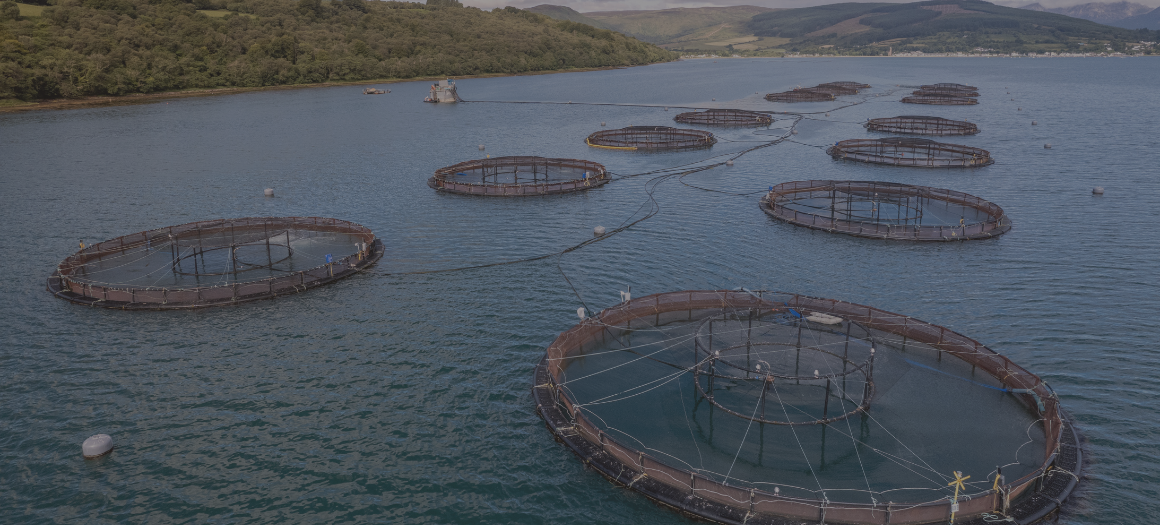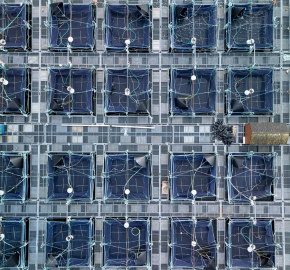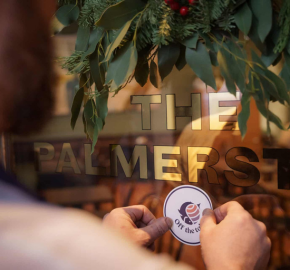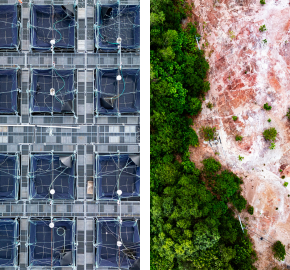WildFish and community groups raise alarm on ‘sustainable’ greenwashing claims made by Scottish salmon farming industry

- WildFish Scotland and Coastal Communities Network Scotland submit legal complaint to Competition and Markets Authority (CMA) over industry’s claims to be ‘sustainable’, as part of the body’s investigation into greenwash claims made by food companies.
- Complaint comes as Scottish salmon farming industry is separately applying for its protected name (Protected Geographical Indication) to be changed from ‘Scottish farmed salmon’ to ‘Scottish salmon’.
- Both reflect attempts by industry to mislead consumers as to the origins and environmental impact of open-net farmed salmon.
The conservation and community groups, WildFish and Coastal Communities Network Scotland (CCN), have today submitted a detailed dossier and complaint to the Competition and Markets Authority (CMA) over claims made by the Scottish salmon farming industry’s trade body, Salmon Scotland.
The complaint details the extensive use of the term ‘sustainable’ by Salmon Scotland in its recent communications, as well as the environmental, welfare and sustainability issues which cast doubt on this claim – including:
- The negative impact of parasites and escaped fish from Scottish salmon farms on wild salmon
- High mortality rates on the farms
- Pollution of the sea by toxic chemicals used by the industry
- Unsustainable use of other fish species as parasite ‘cleaner fish’
- Use of fish from unsustainable wild-caught fisheries to feed farmed salmon
- Increasing use of antibiotics on Scottish salmon farms
- Significant carbon footprint of Scottish salmon farming
“As the CMA recognises, in the minds of consumers a ‘sustainable’ product is one which has a positive environmental impact, or at least no adverse impact. As our complaint makes clear, the Scottish salmon farming industry can make no such claim.”
Rachel Mulrenan, Scotland Director at WildFish
This is not the first time the salmon farming industry has faced criticism about its sustainability claims. In 2019, the Scottish producer Loch Duart stopped advertising itself as ‘sustainable’, following an investigation by the Advertising Standards Authority (ASA).
Similarly, the settlement for a class action lawsuit in the US against Mowi (a global salmon farming company which also operates in Scotland) in 2021 led to the company dropping claims to be ‘sustainable’ from the advertising for some of its US products.
“Many Scottish coastal communities have realised how much harm salmon farming can do. Jobs in these communities depend on the sea being clean and healthy, so it is no surprise that this industry has lost its social licence to operate. Every salmon farm is allowed to discharge all its excrement and pesticides into the sea. They all release parasitic sea lice that can threaten wild salmon and sea trout.”
John Aitchison, spokesperson for CCN
John continued: “They bring feed ingredients from across the globe and then fly much of their produce to the USA and the Far East. To make matters worse, this industry wants to double production by 2030, despite farmed fish mortality spiralling upwards, driven by climate change-enhanced diseases and parasites, and the inhumane treatments it administers for these problems. To call any of this behaviour ‘sustainable’ is unacceptable.”
In January this year, the CMA announced that it would be investigating green claims made by companies in the Fast Moving Consumer Goods (FMCG) sector, which includes food and drink products, cleaning products, toiletries and personal care items. The investigation follows on from the body’s investigation into the fashion industry which was announced in July 2022.
WildFish and CCN’s complaint comes as Salmon Scotland has made moves to change the industry’s Protected Geographical Indication (PGI) from ‘Scottish farmed salmon’, to ‘Scottish salmon’ – a move criticised by numerous environmental and welfare NGOs, as well as chefs and restaurants, as being highly (and deliberately) misleading to consumers.
Rachel continued: “As sustainability issues become increasingly important for consumers, we have here not one, but two ways in which the Scottish salmon farming industry is attempting to pull the wool over consumers’ eyes. More than ever, people need to know the true impact of the products they are buying, using and consuming – so that they can make informed decisions. Recent behaviour by the Scottish industry is the antithesis of transparent – we hope the CMA will recognise this, and take action to tackle this blatant and misleading greenwashing.”




Can you boycott the producers of salmon listed on salmonscotland.co.uk? The problem, too, is that one supplies fish to commercial outlets (for sushi, etc.), so that it’s hard to identify the source of the salmon being consumed.
I completely agree with the above comments on farmed salmon. All farmed salmon should be forced to move on land where their contamination cannot reach the sea.
A filthy industry which should clean up its act by moving on land. We mustn’t forget the fresh water rearing of smolts in very large numbers. This affects the loch water in which the rearing is conducted
In Orkney the sea trout has almost dissapeared. I’ve fished for thes in the sea for 20 years and this year saw none. The coastal waters are contaminated by lots of big salmon”farms”
We’ve seen damaged wild sea trout there for years
How much longer must we put up with this disgusting aquacultural pollution of our environment
Is it possible to put pressure on major supermarkets to see the benefits of de-stocking farmed salmon thus enhancing public opinion of their business.
Also very few established fish restaurants are supporting the campaign to use wild caught salmon, why?
Can pressure be brought to bear?
There are plenty of alternative wild fish instead of farmed salmon.
The sickening disregard by Government and greedy avaricious salmon Farm bosses, with no regard for our habitat and associated wildlife.The huge amounts of disease and ad lib treating on open water causes alarm.To me it seems recklessness on a major scale.If salmon farming kills a loch,it may well kill you…..It is a blight on our landscape,driven by greed,alongside dubious misleading packaging that cons the consumer.enough said!